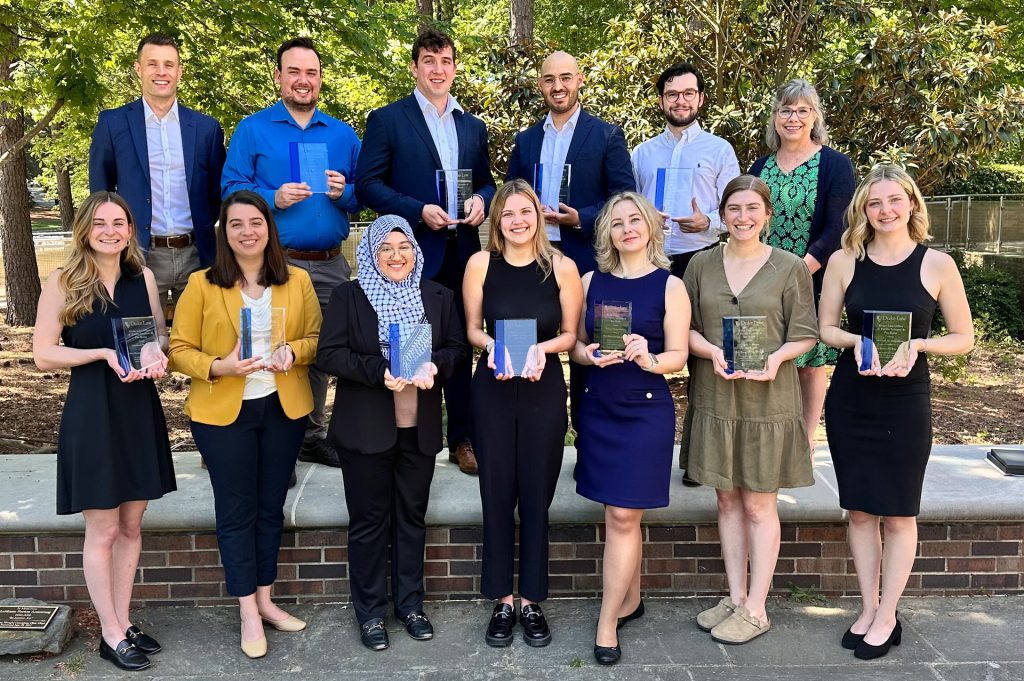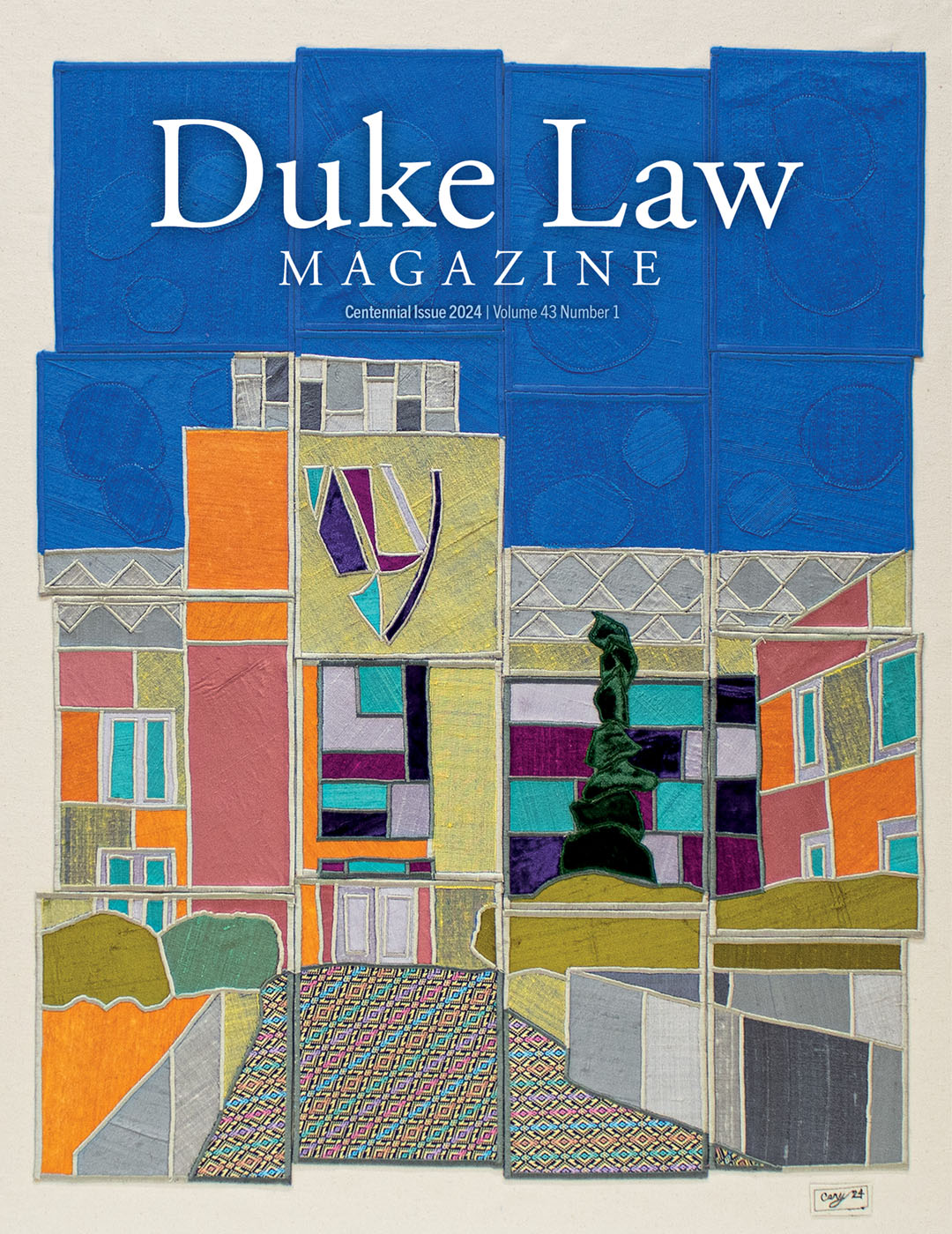
(Back row, from left) D.J. Dore, Director of Pro Bono; Lucas Mears ’24; Brendan Hogan ’24; Maati Ech Chaibi El Hidaoui LLM ’24; Andres Pulido Matallana LLM ’24; Stella Boswell, Associate Dean, Office of Public Interest & Pro Bono. (Front row, from left) Madison Pinckney ’24; Lucy Walton ’24; Nur Shukrina Binte Abdul Salam LLM ’24; Courtney Schrater ’24; Tatiana Chumachenko LLM ‘24; Hannah Bloom ’24; Hannah IsraelMarie ’24. Not pictured: Kathy Zhou ’24; Sam Lawrence ’24; Jackson Samples ’24.
Pro Bono roundup
“Going Gangbusters”
The first semester of law school is packed with new faces, places, and experiences, not to mention a rigorous curriculum and challenging workload.
But that hasn’t stopped 1Ls from adding pro bono work to their plates. Whether they make public service a career or not, pro bono hours show a continuing trend of high engagement among entering students. During the 2023-2024 academic year, the JD class of 2026 recorded nearly 3,000 hours of pro bono work — 48% of the total hours recorded by all classes.
“Anecdotally, the 1L class is far more engaged in pro bono than in previous years,” said Director of Pro Bono Daniel (D.J.) Dore.
“For whatever reason, whether it’s our messaging, the students’ own interests, or they’re all more committed to pro bono, a lot more students have been involved. The 1Ls are doing a great job.”
When Dore joined Duke Law from Legal Aid of North Carolina, where he oversaw pro bono projects with Triangle-area law schools, he set out to revitalize and expand the program after two years of pandemic-related restrictions.
That effort is paying off: Excluding clinics and externships, Duke Law students recorded 6,040 hours of pro bono service in the 2023-2024 academic year through more than a dozen student-run pro bono groups, pop-up, virtual, and recurring clinics, participation in long-term community programs, and other opportunities. Including clinics and externships, students logged 55,800 public service hours.
“There have been a ton of projects going on with a lot of impact,” Dore said. “Everything is going gangbusters.”
Building a habit of pro bono service starts in the first week at Duke Law. 1Ls learn about pro bono work during a professional development class and are challenged to volunteer at least two hours through a class competition called “A Taste of Pro Bono.”
“As a law student, I knew I would only be in this area for a few years and I felt that it was my responsibility to try to give something back to the local community,” said Zeke Tobin ’25, who began pro bono work as a 1L, joining the Durham County guardian ad litem program last spring to advocate for abused and neglected children. “It’s easy to exist in a Duke or Duke Law bubble and become detached from the realities that so many of our neighbors experience.”
“My involvement in pro bono ensured I was practicing actual legal skills and interacting with clients starting in my 1L fall semester,” said Lucy Walton ’24. “This not only helped me develop my abilities like research, writing, and project management, but it also reminded me why I came to law school – to do good. I encourage every law student to get involved with pro bono as soon as they can.”
Walton is one of ten graduating JDs and four LLMs recognized as Class of 2024 Pro Bono All Stars. Collectively, the group contributed more than 6,400 hours of pro bono service during their time at Duke Law, including hours earned in clinics and externships. Now they are pursuing a wide range of career paths, from public defense to corporate law.
“It demonstrates that the legal skills, and perhaps more importantly, the humanizing experiences gained from working with vulnerable clients and communities, helps develop a competency that translates to any career a student may be interested in pursuing,” Dore said.
“I’m confident — and grateful — that each All Star will stay involved with pro bono work as they transition from Duke Law graduate to successful attorney.”
Following are highlights of some of the pro bono projects Duke Law students engaged in this year.
Advocacy results in maximum award
Dore and Tobin secured a maximum award from the North Carolina Crime Victims Compensation program, which helps pay medical, dental, and counseling services for victims of violent crimes, for a teenager who had suffered repeated sexual assaults as a child.
The case had significant challenges: The client lives in eastern North Carolina, her parents speak limited English, and there were sensitivities involving gender and the nature of the crimes.
Acting as attorney guardian ad litem, Dore recruited Tobin to assist him in appealing her teen’s claim, which had been denied due to untimely filing. To build trust, they brought a Spanish-speaking woman as an interpreter on their visits. Thanks to their strong representation, the client was granted a five-figure sum that will help her recover from the trauma that visibly affected her.
“I am happy we were able to secure that maximum award, but that doesn’t begin to truly compensate her for what she went through,” Tobin said. “I know that the money she receives will help her, but I also walk away knowing that she deserves more. And by more, I mean she deserves peace and to be able to fully enjoy her childhood and adolescent years.”
Dore said the case illustrates the importance of introducing law students to pro bono work early.
“It’s one person out of probably thousands, but if each student can help one person, it adds up,” he said.
“That’s why it’s so important to get 1Ls on this track, so that they see these problems and continue to use their privilege to help. Zeke got involved in pro bono as a 1L, and then when an issue presented itself he didn’t hesitate to say yes.
“The takeaway for students is that you don’t have to be an expert to help. An attorney who’s caring and works hard can be the difference between a good outcome or a bad outcome, eviction or no eviction, a five-figure judgment or nothing at all. And it’s just showing up and being present. That, to me, is the definition of pro bono.”
Nine first-year students join Durham Guardian ad Litem program
During the 2023-2024 academic year, nine 1Ls completed a 30-hour immersive training program to become a non-attorney guardian ad litem (GAL).
Maame Adu JD/LLM ’26, Emily Bass ’26, Madison Detweiler ’26, Arielle Roos ’26, and Ryan Welch ’26 were sworn in as GALs in the fall, and Lauren Beizer JD/MA ’26, Katherine Mayer ’26, Dylan Palmer ’26, and Sarah Rosenbloum ’26 were sworn in this spring. District Court Judge Kendra Montgomery-Blinn ’03 performed both ceremonies.
GALs are trained community volunteers who investigate and advocate on behalf of abused and neglected children, many in foster care, whose cases are referred to the court by the Durham County Department of Social Services. Duties include monthly visits to a child or children, interviewing people in their lives, drafting court reports, and sometimes testifying about their findings and recommendations. The program requires a significant time commitment, and GALs are expected to serve until a permanent plan is approved for the client.
“Growing up with a family who provided everything for me, I have recognized the privileged position I am in — to be a reliable person of support for children who need someone they can count on through some of their hardest times,” Beizer said.
“I was drawn to GAL because I have a passion for helping those in need, especially children,” Rosenbloum said. “I am looking forward to making a difference in a child’s life by advocating for his or her best interest in the court system.”
GAL work provides students with an opportunity to hone their investigative and people skills by collaborating with social workers, therapists, and foster parents to determine a child’s best interests, said Jungi Hong ’25, student executive director for the GAL Pro Bono Project, whose enthusiasm Dore credits with helping build the program.
“I’ve always enjoyed working with children, and the most rewarding experience has been building a relationship with the kids. Although I want to work at a federal agency, I hope I can become a GAL in D.C. because I have enjoyed this experience so much.”
Broad Street Law relaunches
Broad Street Law was recognized for greatest service to the outside community at the student-voted D.O.N.E. Awards in April. Formerly known as Street Law, the program relaunched after a pandemic-related hiatus and offers 2Ls and 3Ls the opportunity to teach, mentor, and motivate young people in detention at the Durham Youth Home.
Student facilitators visited the home twice each week to lead an interactive pre-law lesson designed by the group’s curriculum builders on topics such as the criminal justice system, children’s rights, the political system, and constitutional issues.
“The goal is to make it comprehensive yet digestible, engaging yet not daunting — to build enthusiasm for legal education and learning in general,” said Ceren Ege JD/MA ’25, who co-directed the program with Walton.
Students repeatedly surprised facilitators with their candor, curiosity, and willingness to engage, Ege said, wanting to learn about specific areas of the law such as self-defense rights, adoption rights, marriage, and marriage equality. They reflected meaningfully on questions like who should decide laws, what qualities a judge should possess, and the power juries hold.
“Every week we ask our students, ‘What was your favorite thing that happened today?’ and many state it was talking to us,” Ege said. “We love that they enjoy us coming every week and that we can be a safe space for them to speak, learn, and grow. It is a privilege to get to meet these youths and share in their enthusiasm for their future.”
New partnerships help seniors and veterans with vital legal documents
Duke Law began a new partnership in fall 2023 with the North Carolina Central University School of Law Elder Law Project Wills Clinic. Once a month, students and volunteer attorneys visited the Durham Center for Senior Life to complete wills, advance directives, and durable power of attorney documents for low-income senior citizens.
“Participating in the Elder Law Project allowed me to gain valuable experience working with clients while also giving back to the Durham community,” said Anne Hicks ’24. “Moreover, I enjoyed meeting the NCCU law students involved in the Elder Law Project and connecting over our shared experiences.”
Duke Law also began a new partnership in the spring with San Francisco-based veterans assistance organization Swords to Plowshares. Student volunteers helped homeless and low-income veterans in California with VA benefits claims and military discharge upgrade applications under the supervision of Olivia Cole Stanwyck ’17, the organization’s deputy legal director, who is based in North Carolina.

